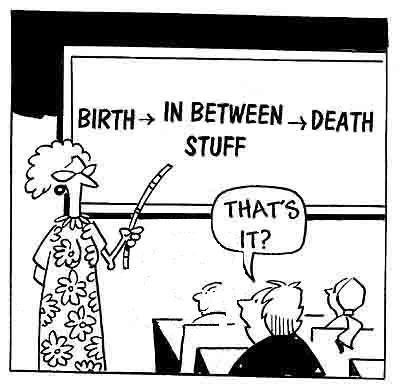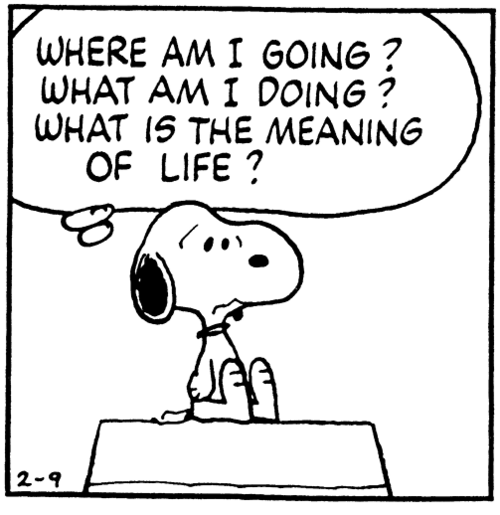I’m always glad to have a reason to pull this out of my archives and dust it off. It represents years of thought, night-long discussions in college, several obscure philosophy courses and at least one 40-page research paper. How bizarre that now, at long last, I live in a world where everything means nothing. This used to be humor, of a sort. Now, it’s not quite as funny.
We spend too much time trying to figure out what life means and too little time doing the stuff we enjoy. I suppose it’s normal to wonder if the reason you are sick, broke, or miserable is the result of something you did or failed to do. Normal, but a waste of time and energy because I’m going to explain everything and you’ll never have to wonder again.
Learning to accept the randomness of stuff that happens is tough. We want life to make sense. We want order. We want our messes and disasters to be important, meaningful.
I’ve put a good bit of thought into why my life has regularly fallen apart. I know I’m imperfect, but whatever I’ve done wrong, it’s small potatoes in the scheme of things. Even in my darkest moments I doubt I’m so wicked that The Big Guy has in for me.
Then I had my epiphany.
You can believe what you want, but you can’t know any more than I do. You take the same leap of faith by believing in God or if you declare yourself an atheist. Both positions require you take as absolute something for which you have no direct proof and for which you will never have proof.
If believing in a loving God makes you feel good, believe it. It could be true. If it turns out you’re right, you’ll have backed a winner. If believing there is no God, and science is the only path (and is antithetical to God — a position with which I disagree) to Truth, go with that. Regardless, you’re making a faith-based choice because there’s no proof God exists or doesn’t exist.
Personally, I don’t know. What makes me smarter than most people is I know I don’t know.
I KNOW NOTHING. NEITHER DO YOU.
Accepting you know nothing is a big step, so take a deep breath. Your next challenge will be how you can cash in on this new knowledge. What’s the point unless you can awe people with your brilliance — and make a few bucks?
You need the right lingo to dazzle your audience. Big words (4 or more syllables) used in the right context can showcase your education and intelligence. People will make little cooing sounds to show their admiration.
Big words enhance your likelihood of getting a management position. You can write important books. Have a blog like me and I know you want to be just like me. Big words can take you a long way, if you are skilled at deploying them.
Note: Make sure you know how to pronounce them. Mispronouncing big words will cause unexpected laughter … not good unless you are aiming for a stand-up comedy career.
EPISTEMOLOGY – IT’S All ABOUT KNOWING
Let’s start with epistemology. This is an excellent catch-all word you can drop into any conversation. Most people will have no idea what you are talking about, but will be too embarrassed to admit it. On the off-chance you encounter someone who actually recognizes the word, you can use this handy-dandy definition from the Stanford Encyclopedia of Philosophy, the philosopher’s convenient source for everything:
Defined narrowly, epistemology is the study of knowledge and justified belief. As the study of knowledge, epistemology is concerned with the following questions: What are the necessary and sufficient conditions of knowledge? What are its sources? What is its structure, and what are its limits?
I bet you still have no idea what it means. The awesome truth is that epistemology doesn’t mean anything because it means everything.
Anything that means everything means nothing. Equally, when something claims to do everything, it has no actual use. This applies to people, software, concepts, and kitchen appliances.
Practically speaking, everything and nothing are exactly the same.
PHENOMENOLOGY IS THE NEW FAITH
On to phenomenology. When I was studying religion in college, phenomenology was a way to prove the existence of God. Phenomenologically speaking, all human experience is proof of God. The same reasoning also proves there is no God. Ah, the joy of it.
Phenomenology can help you prove all things are one thing, all things are God. You are God. I am God. I am a warm cup of tea and you are a daffodil. If this doesn’t clarify it for you, the Stanford Encyclopedia of Philosophy offers further elucidation.
Phenomenology is the study of structures of consciousness as experienced from the first-person point of view. The central structure of an experience is its intentionality, its being directed toward something, as it is an experience of or about some object
In other words, you can use any and all human experience, your experience and anyone else’s, to prove whatever you want. Phenomenology is fundamental to all belief systems: religion, politics, and Fox News. Lots of people believe in religion, politics and Fox News, so maybe they will believe in you too.
As a matter of fact, I’m pretty sure that almost everything our current administration has said fits neatly into phenomenology. Since the only thing that matters in phenomenology is someone’s’ experience, you don’t need facts. Figures. Statistics. You don’t need anything but “I felt it, so it must be true.”
Do you feel it yet?
FOUNT OF WISDOM
You can now explain anything. Everything. You can prove things based on something a couple of friends said years ago while under the influence of powerful hallucinogenic drugs. Although others may fault your logic, in the world of academics, everyone disbelieves everyone else unless they are citing them as a source, so you might as well stick your oar in the water.
There are people who will attack you using faith. Faith is based on itself which makes it hard to dispute. The only person who is ever convinced by faith is the he/she who holds it. Nor does it really matter how many people believe or disbelieve it.
Having more believers or followers doesn’t transform faith into fact.
If faith could transform itself into facts, would we then be living in a rational world? Or at least a more rational one? Or possibly just a wee bit closer to rational? Wish fulfillment as reality has to be magic, right? So magic must exist.
Magical thinking creates magic. Wheee! How delightfully circular!
So, as it turns out, nothing is what I know and nothing seems like a great place to stay in this best of all possible worlds. Welcome to my big wide world of nothing.
Categories: Cartoons, Ethics and Philosophy, Humor, Quotation, Religion






 WHEN EVERYTHING MEANS NOTHING
WHEN EVERYTHING MEANS NOTHING
I’ve always enjoyed this one. Marilyn did you and Garry watch “The Good Place”? I liked it so much I’ve watched the whole series about three times.
LikeLiked by 1 person
We watched it twice, after which I cancelled the station because we’d watched everything on it. It has been a couple of years aod it might be worth signing up again. We LOVED that show.
LikeLiked by 2 people
I had a feeling you would have liked it .
LikeLiked by 1 person
We were addicted to it for a while and when it ended, we watched it again. But obviously it wasn’t coming back since the members of the cast had all moved on.
LikeLiked by 1 person
No they had come to the end of the story arc and there was nothing more to be said.
LikeLike
I just didn’t want it to end.
LikeLike
No, nor did I. They were such engaging characters and I enjoyed learning a bit about moral philosophy. I always think that if a show makes me both laugh and cry it must be a good one.
LikeLike
I remember reading this post before and I think it’s one of your best.
LikeLiked by 1 person
I think it might be my funniest. I really like it because it encompasses my entire college education in one post. I guess that says it for the sad state of college education.
LikeLiked by 2 people